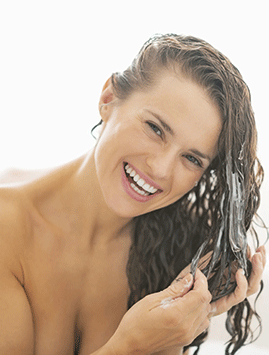Crowning glory!

How to look after your locks the natural way
Conventional haircare products tend to be full of chemical ingredients that can be harmful to our health and wellbeing. These harmful and synthetic chemicals are absorbed through our skin when we apply them to our scalp and could potentially be putting us at risk of disease.
Natural and organic hair products, on the other hand, tend to be made from plant and herb extracts, which are kinder to our locks. We spoke to Dr Elham Eghbali, cosmetic chemist and associate lecturer at Formula Botanica, to find out a bit more about some of the chemical nasties that are found in our haircare products and why we should avoid them.
Ethoxylated ingredients
A great number of conventional shampoos and conditioners contain ethoxylated ingredients. This means that they are made by ethoxylation, a process using ethylene oxide gas, which creates a carcinogenic by-product called 1,4-dioxane. Ethoxylated ingredients are added as primary surfactants (foaming and cleansing), emollients, moisturisers and conditioners.
Examples of ethoxylated ingredients include SLES (sodium laureth sulfate), sodium laureth sulfosuccinate, PEG-7 glyceryl cocoate, olive oil glycereth-8 esters (a synthetic, ethoxylated ingredient derived from olive oil) and PEG-6 Caprylic/Capric Glycerides.
Natural ingredients
Rebecca Goodyear, natural beauty expert and PR representative for Formula Botanica, lists her top five favourite natural ingredients for haircare:
Aloe vera contains proteolytic enzymes which help repair dead skin cells on the scalp. As aloe vera is mostly made up of water it also acts as a great conditioner that leaves hair soft, smooth and shiny. Aloe vera also promotes hair growth, reduces dandruff and helps prevent itchiness of the scalp. Due to its chemical make-up being similar to keratin, aloe vera helps rejuvenate the hair, supplies it with nutrients, and helps improve elasticity thus reducing breakage.
Calendula is a very soothing ingredient and can be used on the scalp to help reduce dandruff, and calm an itchy, flaky scalp. Dandruff and damaged scalps are two main reasons for hair to fall out and, as calendula treats both of these conditions, it can be used to help prevent hair fall. You can also use calendula oil on light brown and blonde hair to create highlights – simply apply and go out in the sun.
Jojoba is very nourishing for the scalp and can help with dandruff control, as well as eczema and psoriasis of the scalp. Jojoba oil is very nourishing to the hair follicles and can help stimulate hair growth and prevent hair loss. It’s also a godsend for dry and frizzy hair. It is able to penetrate the hair follicle and help strengthen hair from the inside out. Due to this ability it is an excellent agent for reducing hygral fatigue – this is the swelling and shrinking that hair experiences as it gets wet and dries, which can leave hair weakened over time.
Vitamin E is a powerful antioxidant that can help protect and repair damaged hair follicles when applied to the scalp, which in turn encourages healthy hair growth. When applied from root to shaft, it also acts as a conditioning agent to help smooth and soften hair, whilst increasing shine.
Sea kelp is rich in essential nutrients to ensure hair growth, including iodine, iron, sodium, phosphorus and calcium and vitamins A, B1, B2, C, D and E. You could do much worse than looking for a shampoo with this ingredient in!
Polyacrylamide
Other ingredients of concern which are very often used in haircare products are film-forming, anti-static and conditioning synthetic polymers with the generic name of polyquaternium-X. Some of these polymers, polyquaternium-7 and polyquaternium-15, for example, belong to the group of polyacrylamides which are considered as ingredients of very high concern by ECHA (the European Chemicals Agency).
Cocamide DEA
This is another notorious ingredient often found in conventional shampoos and shower gels. A chemically-modified form of coconut oil, it is used as a foaming agent. Studies have shown that it can lead to the formation of nitrosamines, which are carcinogenic.
MCI and MI
Methylchloroisothiazolinone (MCI) and methylisothiazolinone (MI) are among the preservatives we often see on the labels of conventional haircare products. They are also used as preservatives in industrial products such as constructional materials and indoor and outdoor paints. Reported cases of sensitisation and allergic reactions are rapidly increasing because of their abundance in skin and haircare products.
Do it yourself
Give your locks a completely natural treat with these DIY hair masks, devised by Rebecca Goodyear
Moisturising banana
Mash together in a bowl one organic banana and three tablespoons of organic virgin cold pressed coconut oil. Then, pour in one tablespoon of olive oil and stir in little by little to smooth out the mixture and apply to dry hair. If you have a shower cap, put it on as this will intensify the treatment. Leave on for up to an hour and then rinse your hair. Follow up with your regular shampoo to ensure no residue is left.
Nourishing avocado
Mash up a ripe avocado until there are no lumps and add a tablespoon of coconut oil, a tablespoon of olive oil and two tablespoons of honey. Mix together until a smooth consistency is formed. Apply to damp hair, massaging well into the scalp and ensuring hair is covered from root to tip. Again, put on a shower cap to intensify the treatment and leave on for up to an hour before rinsing your hair. Follow up with your regular shampoo to ensure no residue is left.
Since 2012, Formula Botanica has taught students all over the world how to create their own original, 100 per cent natural and organic skincare formulations. Formula Botanica is launching a new haircare formulation course later this year. For more details visit www.formulabotanica.com
Read previous Your Look articles here...